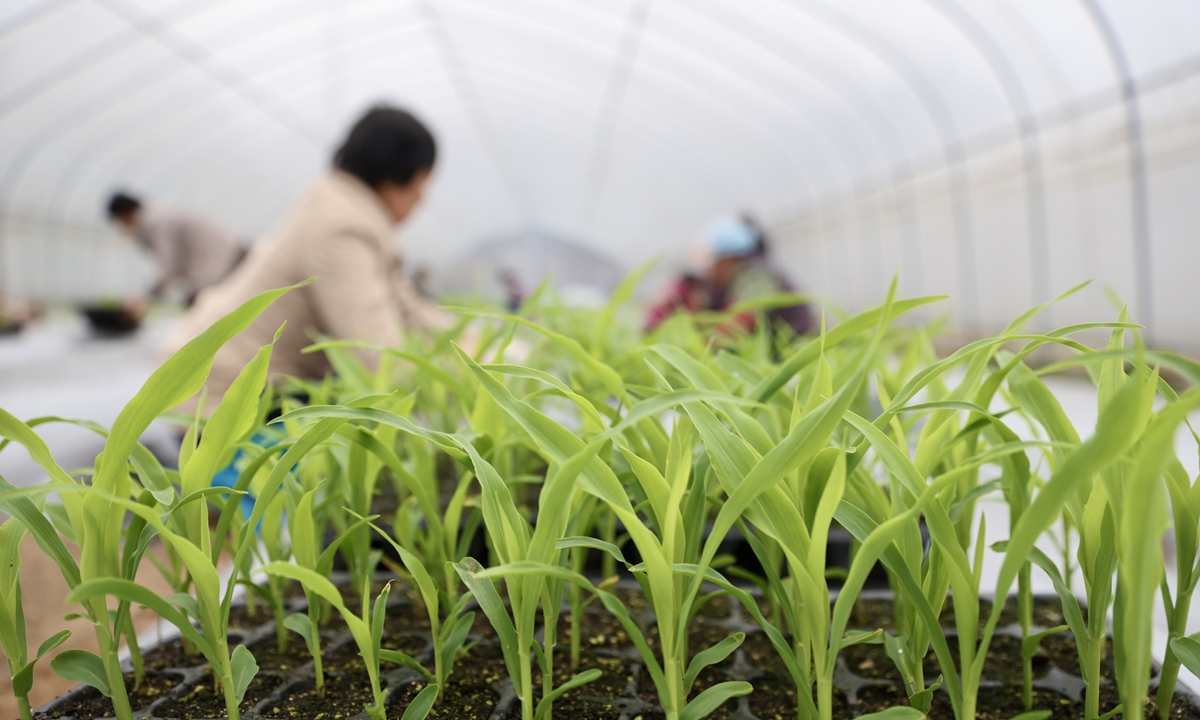
Farmers move corn seedlings into a greenhouse and nurture them in Jiande, East China's Zhejiang Province on February 8, 2023. China will improve the yields of soybeans and corn in 2023 as a key task, according to the Ministry of Agriculture and Rural Affairs. Photo: VCG
China's Ministry of Agriculture and Rural Affairs vowed on Tuesday to further expand the scope of pilot projects for the industrialization of genetically modified (GM) corn and soybeans, in what industry observers called a significant step to the legalization of GM crops in the world's second-largest economy amid efforts to bolster its food security.
The ministry also stressed efforts to strengthen supervision of the technology in accordance with the law.
The remarks were made in a statement on the ministry's website on Tuesday, which outlined priorities of the ministry's work in 2023.
Efforts such as accelerating breakthroughs in key agricultural technologies and expanding soybean production areas are highlighted in the statement.
"China will promote GM pilot projects in line with international standards in an orderly manner this year, and if trials go smoothly and successfully, legalization may take place next year," Li Guoxiang, a research fellow at the Chinese Academy of Social Sciences, told the Global Times on Tuesday.
However, Li stressed that the tests will only involve animal feed rather than human food, due to uncertainties and safety concerns.
"China has conducted careful preparations and strict evaluations for domestic planting of GM crops for many years, and it won't take a 'huge jump' in the area as some media predicted," Li said.
China granted approval for its first domestically developed GM crop strains in 10 years - two corns and one soybean - at the end of 2019, news portal Caixin.com reported.
In June last year, the ministry issued two variety certification standards at the national level for GM crops, including soybeans and corn, reduced the approval period for such varieties, and paved the way for further commercialization in one of the world's top crop-producing countries.
But China's "highly prudent" attitude toward GM crops remains unchanged and won't change soon, Li said.
On February 7, the ministry announced penalties for six violations of safety management of GM crops, including unauthorized environmental release test of GM corn, illegal sales of GM soybeans and illegal GM corn experiments.
Li said that a wider application of China's GM crops such as soybeans and corn will mainly meet domestic demand and increase food security, which won't affect imports.
"Price-competitive and high-quality farm products from 'friendly countries' will still be welcomed by China," Li said.
In its annual rural policy blueprint, known as the "No.1 central document," the State Council, China's cabinet, reiterated its goal of ensuring national food security. Specifically, the document envisions stabilizing the full-year grain sown area, with grain output being above 650 billion kilograms.
This year's No.1 central document gives top priority to grain production and the supply of important agricultural products. The purpose is to ensure that the rice bowls of more than 1.4 billion Chinese people can mainly be filled with Chinese grain, said Minister of Agriculture and Rural Affairs Tang Renjian in mid-February.




